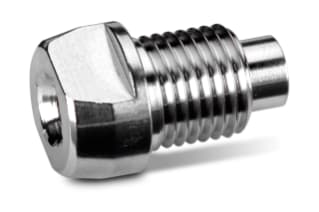
|
Chemistry |
C18 |
|
Separation Mode |
Reversed Phase |
|
Particle Substrate |
Silica |
|
pH Range Min |
3 pH |
|
pH Range Max |
7 pH |
|
Maximum Pressure |
18000 psi (1240 Bar) |
|
Endcapped |
Yes |
|
Bonding Technology |
dC18 |
|
Silanol Activity |
Medium |
|
Particle Shape |
Spherical |
|
Particle Size |
3 µm |
|
Endfitting Type |
Waters |
|
Pore Size |
100 Å |
|
Format |
VanGuard Cartridge |
|
Surface Area |
330 |
|
System |
HPLC |
|
Particle Technology |
Silica |
|
USP Classification |
L1 |
|
Inner Diameter |
2.1 mm |
|
Length |
5 mm |
|
Carbon Load |
12 % |
|
UNSPSC |
41115709 |
|
Brand |
Atlantis |
|
Product Type |
Guards |
|
Units per Package |
3 pk |

Atlantis Silica dC18 VanGuard Cartridge, 100Å, 3 µm, 2.1 mm X 5 mm, 3/pk
Atlantis dC18 VanGuard Cartridges are used to extend analytical column lifetime and performance by removing particulate contamination from the mobile phase stream. This cartridge is optimized to protect all 2.1 mm and 3.0 mm I.D. Atlantis dC18 analytical columns contain 3 µm sorbent particles, designed to safeguard your Atlantis dC18 Column analytical column as it enhances the column's life by preventing any chemical or particulate contaminants from remaining in the mobile phase. This results in your column providing excellent performance over an extended time period, and it also means you have to replace the lab equipment fewer times.
The Atlantis dC18 analytical column is a universal C18 Column and fully LC/MS compatible. It has been designed to provide an ideal balance of retention for polar and nonpolar compounds without exhibiting excessive retention of hydrophobic compounds in contrast to the conventional reversed-phase HPLC columns. The Atlantis dC18 Column provides enhanced pH stability and is compatible with aqueous mobile phases. With its specially designed packing material that provides retention and separation of polar, water-soluble compounds, this silica-based, di-functionally bonded C18 material of this equipment makes it an ideal piece of lab equipment for reversed-phase HPLC.
The Atlantis dC18 Column combines optimized stationary phase attributes, including but not limited to, end-capping, silica pore size, ligand type, and bonded phase ligand density, to provide superior peak shape, low pH stability, enhanced polar compound retention and resistance to hydrophobic collapse (dewetting). As one of the ideal reversed-phase HPLC columns, the Atlantis dC18 Column is suitable for both the separation of polar compounds as well as standard applications of reversed-phase. The Atlantis dC18 column utilizes the di-functional silane bonding chemistry to provide excellent stability under acidic mobile conditions and also provides an extended column lifetime along with low pH stability.
To learn more about the collection of Waters product offerings, please check out our website or browse through the catalog, so you can shop for lab equipment and ensure your lab needs are met as needed.
You should also review LCMS Certified Clear Glass 12 x 32 mm Screw Neck Vial, with Cap and Preslit PTFE/Silicone Septum, 2 mL Volume, 100/pk; Each and every Waters LCMS Certified vial is made using strictly regulated manufacturing and handling techniques. They are examined using mass spectrometers, and a certificate of analysis displaying the reference and vial scan for the production batch is supplied with them.
Why Can Only Cations Be Found in Mass Spectrometry?
When employing mass spectrometry to determine the mass of charged particles, only ions can be identified, while neutral molecules remain undetected.